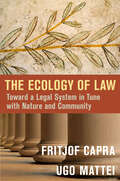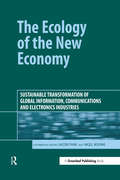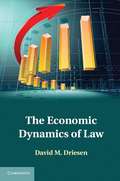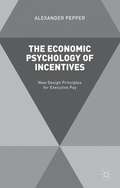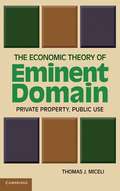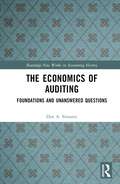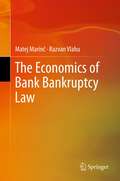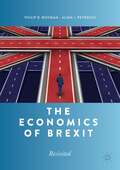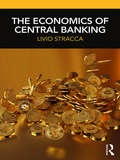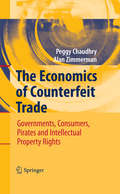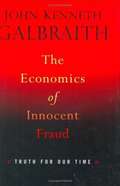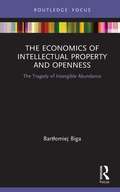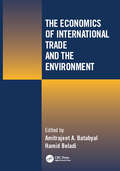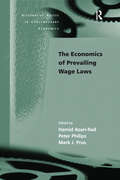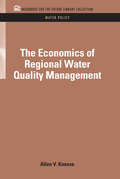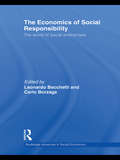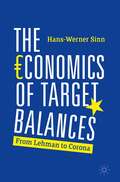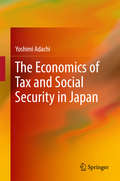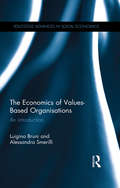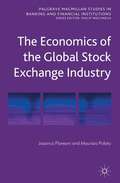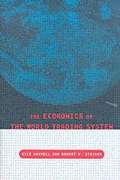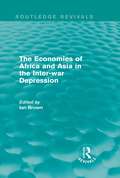- Table View
- List View
The Ecology of Law: Toward a Legal System in Tune with Nature and Community
by Fritjof Capra Ugo MatteiWINNER OF THE 2015 IBPA BENJAMIN FRANKLIN AWARD IN POLITICS/CURRENT EVENTSThe Ecology of Law Fritjof Capra and Ugo Mattei argue that at the root of many of the environmental, economic, and social crises we face today is a legal system based on an obsolete worldview. Capra, a bestselling author, physicist, and systems theorist, and Mattei, a distinguished legal scholar, explain how, by incorporating concepts from modern science, the law can become an integral part of bringing about a better world, rather than facilitating its destruction. This is the first book to trace the fascinating parallel history of law and science from antiquity to modern times, showing how the two disciplines have always influenced each other—until recently. In the past few decades, science has shifted from seeing the natural world as a kind of cosmic machine best understood by analyzing each cog and sprocket to a systems perspective that views the world as a vast network of fluid communities and studies their dynamic interactions. The concept of ecology exemplifies this approach. But law is stuck in the old mechanistic paradigm: the world is simply a collection of discrete parts, and ownership of these parts is an individual right, protected by the state. Capra and Mattei show that this has led to overconsumption, pollution, and a general disregard on the part of the powerful for the common good. Capra and Mattei outline the basic concepts and structures of a legal order consistent with the ecological principles that sustain life on this planet. This is a profound and visionary reconceptualization of the very foundations of the Western legal system, a kind of Copernican revolution in the law, with profound implications for the future of our planet.
The Ecology of the New Economy: Sustainable Transformation of Global Information, Communications and Electronics Industries
by Jacob Park Nigel RoomeA "revolution" is taking place in the development of global information and communications technologies. In slightly more than a decade, the World Wide Web has gone from the idea of an obscure English scientist to a consumer-oriented technology system with an expected one billion users by 2005. The technologies that enable this to happen are advancing rapidly, which is leading to both an unprecedented number of start-up companies and a host of innovative new alliances between companies. The growth has been so rapid and unexpected that little research and analysis has yet been done on what impact this transformation has had or will have on the ability of companies to meet the global sustainability challenge. As environmental strategy has traditionally been portrayed in terms of risk cutting and resource efficiency, there is a danger that critical business issues such as information technology, R&D and e-commerce development are examined in isolation from the wider sustainable business perspective. An important objective of the book is to explore, document and raise awareness of sustainability concerns arising from the emerging global information economy. The information economy is defined in the broadest sense possible, including software, hardware, telecommunication – traditional and wireless – and advanced communication technologies. Some of the key issues and questions that are examined include:Case studies on how and to what degree sustainability concerns are being integrated into the business model of electronic, telecommunication and dot.com firms. The relationship between the diffusion of information and communication technologies and the energy and resource intensity of companies. The role of information and communication technologies in the shaping of policies for sustainability, its impacts on sustainable or unsustainable lifestyles and its implications for the interaction between companies and other actors. Corporations and the global digital divide. The Ecology of the New Economy will be of interest to academics, governments, businesses, and non-governmental groups who are trying to understand the linkages and relationship between the two of our greatest global challenges: the information revolution and environmental sustainability.
The Economic Dynamics of Law
by David M. DriesenThis book offers a dynamic theory of law and economics focused on change over time, aimed at avoiding significant systemic risks (like financial crises and climate disruption) and implemented through a systematic analysis of law's economic incentives and how people actually respond to them. This theory offers a new vision of law as fundamentally a macro-level enterprise establishing normative commitments and a framework for numerous private transactions, rather than as an analogue to a market transaction. It explains how neoclassical law and economics sparked decades of deregulation culminating in the 2008 financial collapse. It then shows how economic dynamic theory helps scholars and policymakers make wise choices about how to avoid future catastrophes while keeping open a robust set of economic opportunities, with individual chapters addressing the law and economics of financial regulation, contract, property, intellectual property, antitrust, national security and climate disruption.
The Economic Psychology of Incentives
by Alexander PepperThis book proposes a revised theory of agency, drawing on ideas from behavioural economics and built on more robust assumptions about human behaviour than the standard principal-agent model. The book proposes new design principles for executive pay, but also explains the difficulties in changing current executive pay practices.
The Economic Psychology of Tax Behaviour
by Erich KirchlerTax evasion is a complex phenomenon which is influenced not just by economic motives but by psychological factors as well. Economic-psychological research focuses on individual and social representations of taxation as well as decision-making. In this 2007 book, Erich Kirchler assembles research on tax compliance, with a focus on tax evasion, and integrates the findings into a model based on the interaction climate between tax authorities and taxpayers. The interaction climate is defined by citizens' trust in authorities and the power of authorities to control taxpayers effectively; depending on trust and power, either voluntary compliance, enforced compliance or no compliance are likely outcomes. Featuring chapters on the social representations of taxation, decision-making and self-employed income tax behaviour, this book will appeal to researchers in economic psychology, behavioural economics and public administration.
The Economic Structure of Intellectual Property Law
by Richard A. Posner William M. LandesThis book takes a fresh look at the most dynamic area of American law today, comprising the fields of copyright, patent, trademark, trade secrecy, publicity rights, and misappropriation. Topics range from copyright in private letters to defensive patenting of business methods, from moral rights in the visual arts to the banking of trademarks, from the impact of the court of patent appeals to the management of Mickey Mouse. The history and political science of intellectual property law, the challenge of digitization, the many statutes and judge-made doctrines, and the interplay with antitrust principles are all examined. The treatment is both positive (oriented toward understanding the law as it is) and normative (oriented to the reform of the law). Previous analyses have tended to overlook the paradox that expanding intellectual property rights can effectively reduce the amount of new intellectual property by raising the creators' input costs. Those analyses have also failed to integrate the fields of intellectual property law. They have failed as well to integrate intellectual property law with the law of physical property, overlooking the many economic and legal-doctrinal parallels. This book demonstrates the fundamental economic rationality of intellectual property law, but is sympathetic to critics who believe that in recent decades Congress and the courts have gone too far in the creation and protection of intellectual property rights.
The Economic Theory of Eminent Domain
by Thomas J. MiceliSurveys the contributions that economic theory has made to the often contentious debate over the government's use of its power of eminent domain, as prescribed by the Fifth Amendment. It addresses such questions as: when should the government be allowed to take private property without the owner's consent? Does it depend on how the land will be used? Also, what amount of compensation is the landowner entitled to receive (if any)? The recent case of Kelo v. New London (2005) revitalized the debate, but it was only the latest skirmish in the ongoing struggle between advocates of strong governmental powers to acquire private property in the public interest and private property rights advocates. Written for a general audience, the book advances a coherent theory that views eminent domain within the context of the government's proper role in an economic system whose primary objective is to achieve efficient land use.
The Economics of Auditing: Foundations and Unanswered Questions (Routledge New Works in Accounting History)
by Dan A. SimunicThe financial information provided to governments, creditors, investors etc. by businesses has been verified by auditors since ancient times. In its modern form, the independent public accounting profession has its roots in 19th century Scotland. A distinctive feature of this profession is that it consists of private for-profit businesses – operating as sole practitioners, partnerships, but mostly as large accounting firms. The question naturally arises – why should users of financial information provided by private for-profit firms place trust in the verification of that information by other private for-profit firms? This is the interesting and complex economic issue that underlies research in what has come to be called ‘the economics of auditing’. The author is one of the first researchers in this area. This book traces the development of this important stream of research that applies economic analysis to the study of financial statement audits by professional public accounting firms. It offers a narrative commentary, along with a series of previously unpublished papers that the author presented during the 1970’s, at Accounting Research workshops at the University of Chicago, as part of his dissertation research, that ultimately led to one of the bedrock papers in the field. It provides an explanation and discussion of the economic, regulatory, and research environment at that time. The book concludes with a discussion of important but currently “unanswered questions” in the field that flow from the author’s thesis research but remain unresolved. It will be of significant interest to advanced students and academics who are engaged in developing their own research programs, as well as to any researcher who is working in the area of the ‘economics of auditing’.
The Economics of Bank Bankruptcy Law
by Razvan Vlahu Matej MarinčThis book shows that a special bank bankruptcy regime is desirable for the efficient restructuring and/or liquidation of distressed banks. It explores in detail both the principal features of corporate bankruptcy law and the specific characteristics of banks including the importance of public confidence, negative externalities of bank failures, fragmented regulatory framework, bank opaqueness, and the related asset-substitution problem and liquidity provision. These features distinguish banks from other corporations and are largely neglected in corporate bankruptcy law. The authors, an assistant professor for money and finance and a research economist at the Dutch Central Bank, propose changes in both prudential regulation and reorganization policies that should allow regulators and banking authorities to better mitigate disruptions in the financial system and minimize the social costs of bank failures. Their recommendations are complemented by a discussion of bank failures from the 2007-2009 financial crisis.
The Economics of Brexit: Revisited
by Philip B. Whyman Alina I. PetrescuThe Economics of Brexit – Revisited builds upon and extends the analysis contained within the authors' previous book, The Economics of Brexit: A Cost-Benefit Analysis of the UK's Economic Relationship with the EU, which arguably represented the most comprehensive and systematic evaluation of the UK’s economic relationship with the EU. The Economics of Brexit – Revisited continues where the previous volume left off, given that the UK has now formally withdrawn from the EU, and therefore the focus of the evidence presented concerns the potential economic implications arising from Brexit and considering the options available to those negotiating the UK's future economic relationship both regionally and globally. The Economics of Brexit – Revisited seeks to provide greater clarity to a range of issues that have been hotly debated over the past few years, ranging from the trade and fiscal implications of Brexit, to the economic impact of regulation and migration. The significance of different Brexit options are discussed in detail, including the significance of demands for regulatory harmonisation (the 'level playing field'), along with their implications for UK trade with the EU and the rest of the world. A wide range of economic analyses are evaluated to determine their relative methodological strengths and weaknesses, and ultimately whether their conclusions are sufficiently robust to engender confidence. Finally, noting that a key determinant of the effectiveness of any post-Brexit economic strategy depends upon the degree of flexibility created for economic policy, the book provides an extended examination of the potential relating to different economic policy options available to the UK government, depending upon the form of final trade settlement that is agreed with the EU. These policy options include more active forms of macroeconomic management, combined with industrial and procurement policy. The Economics of Brexit – Revisited therefore seeks to combine evaluation of the available evidence indicating the economic impact of Brexit, together with consideration of policy trade-offs that lie at the heart of the choices surrounding Brexit, and how these might be resolved.The Economics of Brexit – Revisited therefore maintains its position as the most comprehensive analysis of the economics of Brexit in the market today.
The Economics of Central Banking
by Livio StraccaThis book offers a comprehensive analysis of central banks, and aims to demystify them for the general public, which is the only way to have a rational debate about them and ultimately to make them truly accountable. The book originates from the author’s graduate lectures on Central Banking at the University of Frankfurt J.W. Goethe. It contains an overview of all the key questions surrounding central banks and their role in the economy. It leads the reader from the more established concepts (including monetary theory and historical experience), necessary to have a good grasp of modern central banking, to the more open and problematic questions, which are being debated within academic and financial market circles. This structure enables readers without specific knowledge of central banks or monetary economics to understand the current challenges. The book has three defining characteristics, which set it apart from competing titles: first, it is pitched at the general public and uses simple and entertaining language. Second, it is rooted in, and makes frequent reference to, recent academic research, based on content for a graduate level course. Third, the author thinks 'out of the box' in order to describe the possible evolution of central banks (including the prospect of their disappearance), and not only the status quo.
The Economics of Counterfeit Trade
by Alan Zimmerman Peggy E ChaudhryWalk down any main street in Shanghai, Paris or New York and you will see evidence of the counterfeit goods trade. Everyone has seen or heard of fake Prada bags or Omega watches. But how large is the counterfeit market? It appears that the same numbers have been quoted repeatedly in sources ranging from serious academic journals to the BBC to the Sydney Morning Herald. This is the first book to fully examine the size of the counterfeit market. Many authors have proposed actions to combat counterfeiting. Chaudhry and Zimmerman are the first to take a global look at the intellectual property environment using a research-based approach. This book also gives international business managers practical, tested tools they can use to combat piracy. These recommendations are based on the successful experience of managers wrestling with these problems every day. The book is based on solid research but written in an accessible style.
The Economics of Innocent Fraud: Truth for Our Time
by John Kenneth GalbraithThe primary aspect of the "fraud" of the American economy that Galbraith (emeritus, economics, Harvard U.) criticizes is the false pretense of shareholder control over corporations, when in fact all real power has shifted to corporate managers. Contradicting conventional wisdom, or "approved belief" in his words, he denies the distinction between the private and public sectors, describing how the managerial class has unprecedented power in the economy's public sector, including major influence over important policies of war or peace. In the end, the continuing references to an impersonal market are "a not wholly innocent fraud."
The Economics of Intellectual Property and Openness: The Tragedy of Intangible Abundance (Routledge Focus on Economics and Finance)
by Bartłomiej BigaThis book focuses on the economic aspects of intellectual property (IP). It includes considerations of the wider category of intangible assets. However, the primary focus is devoted to patents which the author argues are the most vivid example of the Tragedy of Intangible Abundance (TIA). TIA touches upon a key issue in the contemporary economy. On the one hand, there is an enormous supply of IP, yet, on the other hand, such an abundance does not necessarily solve existing issues but rather creates new ones as well. This book elaborates on the reasons for the emergence of TIA and its consequences. The author uses clear metaphors to explain very complex issues. The book provides a valuable and interdisciplinary analysis of the field and offers practical solutions. It is based on the data collected by the author during the qualitative research he conducted among a group of start-ups. It presents guidance on determining which instrument is the most efficient for a particular situation. It also provides arguments for decision-makers and their advisors as to why a more open approach towards intellectual property would be more beneficial under many circumstances in the contemporary economy. While universal issues are addressed, the author distinguishes the European perspective too. The book is written in a clear and concise style and covers all of the crucial aspects of IP management. It will find an audience among scholars of economics and business.
The Economics of International Trade and the Environment
by Amitrajeet A. Batabyal Hamid BeladiIssues related to environmental protection and trade liberalization have moved to the forefront of international policy agendas. The Economics of International Trade and the Environment explores - from an economic standpoint - many of the questions that are germane in increasing our knowledge of environmental policy in the presence of international
The Economics of Prevailing Wage Laws (Alternative Voices in Contemporary Economics)
by Peter PhilipsPrevailing wage laws affecting the construction industry in the United States exist at the Federal and State levels. These laws require that construction workers employed by contractors on government works be paid at least the wage rates and fringe benefits 'prevailing' for similar work where government contract work is performed. The federal law (Davis-Bacon Act) was passed in 1931. By 1969 four fifth of States had enacted prevailing wage legislation. In the 1970s, facing fiscal crises, States considered repealing their laws in an effort to reduce construction costs, and since 1979 nine States have repealed their laws. These repeals at State level along with unsuccessful attempts to repeal the Davis-Bacon Act have pushed prevailing wages to the forefront of public policy and controversy. This book, for the first time, brings together scholarly research in the economics of prevailing wages placed in historical and institutional context.
The Economics of Race in the United States
by Brendan O'FlahertyBrendan O'Flaherty brings the tools of economic analysis-incentives, equilibrium, optimization, and more-to bear on contentious issues of race in the United States. In areas ranging from quality of health care and education, to employment opportunities and housing, to levels of wealth and crime, he shows how racial differences among blacks, whites, Hispanics, and Asian Americans remain a powerful determinant in the lives of twenty-first-century Americans. More capacious than standard texts, The Economics of Race in the United States discusses important aspects of history and culture and explores race as a social and biological construct to make a compelling argument for why race must play a major role in economic and public policy. People are not color-blind, and so policies cannot be color-blind either.<P><P> Because his book addresses many topics, not just a single area such as labor or housing, surprising threads of connection emerge in the course of O'Flaherty's analysis. For example, eliminating discrimination in the workplace will not equalize earnings as long as educational achievement varies by race-and educational achievement will vary by race as long as housing and marriage markets vary by race. No single engine of racial equality in one area of social and economic life is strong enough to pull the entire train by itself. Progress in one place is often constrained by diminishing marginal returns in another. Good policies can make a difference, and only careful analysis can figure out which policies those are.
The Economics of Regional Water Quality Management (RFF Water Policy Set)
by Allen V. KneeseFirst Published in 2011. Routledge is an imprint of Taylor & Francis, an informa company.
The Economics of Social Responsibility: The World of Social Enterprises (Routledge Advances In Social Economics Ser. #15)
by Leonardo BecchettiThis book offers a rethinking of the burgeoning research on not-for-profit organizations and socially responsible economics. Adopting a comparative approach, the chapters explore and reinterpret the impact of social enterprises on the provision of general-interest services, work integration, microfinance, and fair trade, and show how these enterprises form the hub of an emerging economy of social responsibility. The book provides a new interpretation of social enterprises as entrepreneurial organizations that pursue social objectives and are successful due to the non-self-seeking motives of their members. This book will be of interest to postgraduate students, professionals working in the not-for-profit sector, and scholars interested in socially responsible economics. It is particularly suitable for seminars and workshops focusing on the management of not-for-profit organizations, sustainable development, and globalization.
The Economics of Target Balances: From Lehman to Corona
by Hans-Werner SinnTarget balances are the largest single item in some of the balance sheets of the Eurosystem’s national central banks (NCBs), and yet very little is known about them by the general public and even by economists. This book shows that Target balances measure overdraft credits between the NCBs that resemble ordinary fiscal credit and which have grown disproportionately, exceeding one billion euros. There is, however, no parliamentary legitimation for the Target balances. The book sheds light on the economic significance of the balances, questions their limitlessness, and addresses controversial views that have been expressed regarding them. It uses the Target statistics to analyze the course of the euro crisis and the ECB’s policy reactions from the time of the Lehman bankruptcy up to the outbreak of the Corona crisis. It analyses the credit risks involved for the Eurosystem and concludes with a reform proposal. This book will be of interest to non-specialist economists and policy makers.
The Economics of Tax and Social Security in Japan
by Yoshimi AdachiThis book integrates the fundamentals of quantitative significance, using existing estimates of the elasticities of demand for tax, health insurance, and medical services in a static microsimulation model. It serves as a guide to the financial and social basics of health insurance and provides the reader with the intellectual groundwork indispensable for understanding the incorrect assumptions about the elasticities of demand and pattern of tax and health insurance. Most countries feel constant pressure because expenditure is increasing and resources are scarce. The topics addressed in this book including several frameworks leading to over-insurance, excess demand for medical care, and rapid expenditure growth in the medical care sector. Illustrated by carefully chosen examples and supported by extensive data analyses, this book is highly recommended to readers who seek an in-depth and up-to-date integrated overview of the ever-expanding theoretical and quantitative fields of containing costs, increasing funding for health services, or both.
The Economics of Values-Based Organisations: An Introduction (Routledge Advances in Social Economics)
by Luigino Bruni Alessandra SmerilliThis book looks at the governance of values-based organizations (VBOs), which are organizations with a mission and identity based on ideals. Examples of VBOs include non-profit organizations, charities, NGOs, environmental, educational or cultural organizations, and social enterprises. The main objective of any VBO is to evolve and grow without losing its identity, which its survival is linked to in the medium and long terms. The focus of this book is the study of the relational and motivational dynamics during identity crisis, using critical mass models and Hirschman’s "exit and voice" framework. This book analyses the dynamics that arise in VBOs when the quality of the ideal deteriorates. On the basis of Hirschman’s "exit and voice" model, it analyses the factors that lead the best members – the intrinsically motivated ones who care most about the mission and ideals of the organization – to leave if their voice is ignored. We show that the possible cumulative effects caused by the "exit" of intrinsically motivated members can lead the organization to a process of deterioration. This book offers an analysis of these phenomena, which are usually studied in sociology or political science, by using an economic approach and the language of evolutionary game theory. By combining sociological politics and economics as a theoretical tool, we create a fresh approach to explore crises in organizations.
The Economics of the Global Stock Exchange Industry
by Josanco Floreani Maurizio PolatoThis book is an economic analysis of the stock exchange industry. The authors draw on theories from micro- and industrial economics to provide a detailed analysis of the industry structure, the strategic behaviour of key participants and the performance of stock exchanges.
The Economics of the World Trading System
by Kyle Bagwell Robert W. StaigerWorld trade is governed by the rules of the World Trade Organization (WTO), the successor to the General Agreement on Tariffs and Trade (GATT). The WTO sets rules of conduct for the international trade of goods and services and for intellectual property rights, provides a forum for multinational negotiations to resolve trade problems, and has a formal mechanism for dispute settlement. It is the primary institution working, through rule-based bargaining, at freeing trade. In this book, Kyle Bagwell and Robert Staiger provide an economic analysis and justification for the purpose and design of the GATT/WTO. They summarize their own research, discuss the major features of the GATT agreement, and survey the literature on trade agreements. Their focus on the terms-of-trade externality is particularly original and ties the book together. Topics include the theory of trade agreements, the origin and design of the GATT and the WTO, the principles of reciprocity, the most favored nation principle, terms-of-trade theory, enforcement, preferential trade agreements, labor and environmental standards, competition policy, and agricultural export subsidies.
The Economies of Africa and Asia in the Inter-war Depression (Routledge Revivals)
by Ian BrownThe great inter-war depression has long been seen as an unprecedented economic disaster for the peoples of the non-European world. This book, with its detailed assessment of the impact of the depression on the economies of Africa and Asia, challenges the orthodox view, and is essential reading for those with a teaching or research interest in the modern economic history of those continents. Established specialists in the modern economic history of parts of Africa or Asia put forward a number of revisionist arguments. They show that some economies were left essentially unscathed by the depression, and that for many export-dependent peasant communities which did face a severe drop in cash income as world commodity prices collapsed from the late 1920s, there was a range of important responses and reactions by which they could defend their economic welfare. For many peasant communities the depression was not a disaster but an opportunity.
